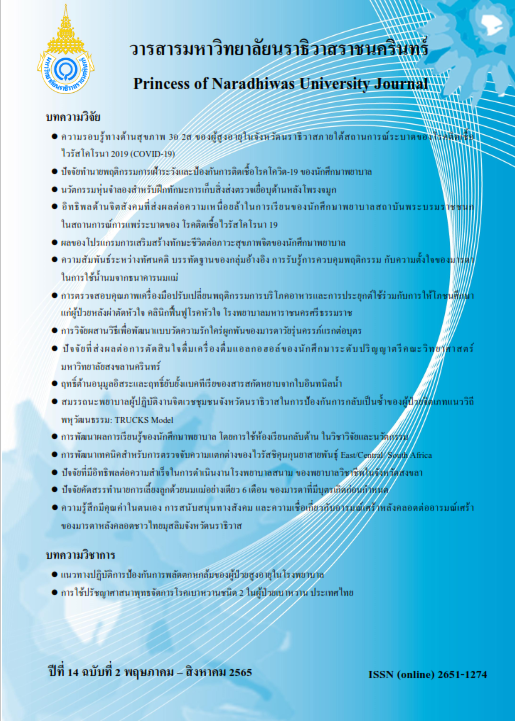Effects of Life Skills Training Program on Mental Health Status of Nursing Students
Keywords:
Life skills training program, Mental health status, Nursing studentsAbstract
The first year for nursing students is known as a transition period that can cause mental health problems; therefore, training in life skills may decrease their difficulties. The aim of this research was to study the effects of the life skills training program based on the World Health Organization regarding the mental health status of nursing students. A quasi-experimental study, with two groups, pre- and posttest, with a follow-up 4-week design was used. Simple random sampling was used to select a sample group of 50 first-year nursing students from Boromarajonani College of Nursing, Phraputthabat, Thailand, in the academic year of 2020, divided into the experimental (n = 25) and control (n = 25) groups. The interrater opinion of the intervention program was 0.99. The General Health Questionnaire (GHQ-28) was used to evaluate the nursing students’ mental health status, with reliability at 0.86. Analysis of the demographic data was conducted by descriptive statistics, independent t-test, two-way repeated measures ANOVA and repeated ANOVA with multiple comparisons by Bonferroni’s method.
The results showed that mean score of the mental health of the experimental group was significantly lower than that of the control group (p < .001, both post-test and follow-up), while the mean score of the mental health of the experimental group after participating in this program and the follow-up were significantly lower than the pre-test (p < .001). Based on these results, it is recommended that nursing education should use this program in the extra-curriculum activities to support the mental health of the first-year nursing students.
References
Barker, E.T., Galambos, N.L., Howard, A.L., & Wrosch, C. (2016). Tracking affect and academic success across university: happy students benefit from bouts of negative mood. Development Psychology, 52, 2022-2030.
Burns, N., & Susan, K. (2011). The practice of nursing research: appraisal synthesis, and generation of evidence (6th ed.). Missouri: Saunders.
Donelson, R. (2010). Group dynamics. California: Wadsworth, Cengage Learning.
Goldberg, D.P. (1972). The detection of psychiatric illness by questionnaire. London: Oxford University Press.
Irannezhad, S. (2017). Effectiveness of life-skills training on the mental health of 2nd grade female high school students in Bam-Iran. Bali Medical Journal, 6(3), 583-588.
Jamali, S., Sabokdast, S., Nia, H.S., Goudarzian, A.H., Beik, S., & Allen, K.A. (2016). The effect of life skills training on mental health of Iranian middle school students: a preliminary study. Iranian Journal of Psychiatry, 11(4), 269-272.
Khumtorn, L., & Suwanvela, S. (2018). The relationship between social Support and life skills among nursing students in Boromarajonani College of Nursing, Trang. Journal of Department of Health Service Support, 14(1), 54-68.
Krongyudh, S., Chaimongkol, N., & Vatanasin, D. (2017). Influencing of life skills on mental health in early adolescents. Journal of Nursing and Health Care, 35(2), 54-62.
Naeim, M., Rahimi, H.R., Soltani, F., Farazandeh, F., Nejad, F.M., & Sharafi, M.R. (2016). The role of life skills and self-efficacy in mental health among male students in high school. International Journal of Medical Research & Health Sciences, 5(7S), 118-126.
Nilchaikovit, T., Sukying, C., & Silpakit, C. (1996). Reliability and validity of the Thai version of the general health questionnaire. Journal of the Psychiatric Association of Thailand, 41(1), 2-17.
Nintachan, P., Orathai, P., & Visudtibhan, P.J. (2014). A casual model of negative events, family atmosphere, resilience, and mental health of nursing students. Ramathibodi Nursing Journal, 20(3), 401-414.
Phuipha, T., Bunthumporn, N., & Vuthiarpa, S. (2018). The effect of a life-skill training program on the depressive symptoms of senior high school students. Journal of Royal Thai Army Nurse, 9(Suppl), 89-98.
Rahmani, M. (2019). The effect of life skills training on mental health and student self-esteem. Global Journal of Human-Social Science: Arts & Humanities Psychology, 19(4), 23-30.
Ruangkit, P., Maneerat, S., & Meebunmak, Y. (2019). A study of the relationships between mental health status and stress of nursing student of Boromarajonani College of Nursing Nopparat Vajira. Veridian E-Journal, Silpakorn University, 12(1), 1208-1224.
Somchit, S., & Namfone, N. (2013). The health status of early adolescent in Sathorn, Bangkok Metropolitan. Naresuan University Journal, 21(1), 55-63.
Sripho, S., Vatanasin, D., & Nabkasorn, C. (2019). The effect of emotional quotient enhancement program on mental health among nursing students. Journal of Phrapokklao Nursing College, 30(2), 76-87.
Tantalanukul, S., & Wongsawat, P. (2017). Stress and stress management in nursing students. Boromarajonani College of Nursing, Uttaradit Journal, 9(1), 81-92.
World Health Organization. (1994). Life skill education for children and adolescents in schools. Geneva: World Health Organization.
Zhang, Y., Peters, A., & Chen, G. (2018). Perceived stress mediates the associations between sleep quality and symptoms of anxiety and depression among college nursing students. International Journal of Nursing Education Scholarship, 15(1).
Additional Files
Published
How to Cite
Issue
Section
License
Copyright (c) 2022 Princess of Naradhiwas University Journal

This work is licensed under a Creative Commons Attribution-NonCommercial-NoDerivatives 4.0 International License.




